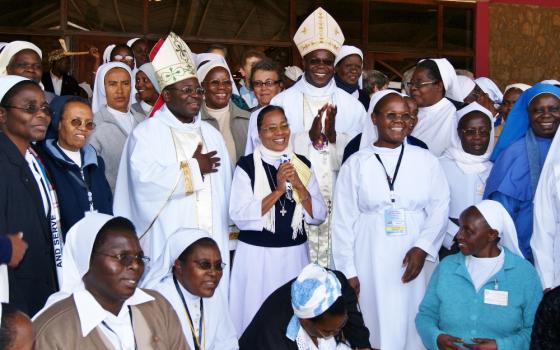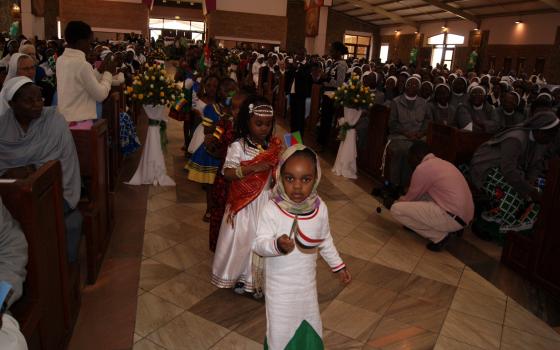If you’re a fan of Catholic sisters, you’ve probably heard already about Nicholas Kristof’s column in The New York Times over the weekend.
“In an age of villainy, war and inequality, it makes sense that we need Superheroes,” he begins. “And after trying Superman, Batman and Spider-Man, we may have found the best superheroes yet: Nuns.”
Now I’m certainly a fan. But I didn’t see the Kristof piece until now, catching up with the news from Lusaka, Zambia, where I’m attending a gathering of women religious leaders from nine African countries.
The Association of Consecrated Women in Eastern and Central Africa, commonly known as ACWECA, meets every three years to collaborate, plan strategically, share challenges and offer support – and, this year, to celebrate its 40th anniversary – which they marked on Sunday at the Cathedral of the Child Jesus, in a joyful Eucharistic celebration commending the sisters’ work, described by one speaker as “testimony of your love for humanity.”
Come Monday, though, it was down to work in an airy meeting room decorated simply with images of flowers and African flags along the walls. The theme for this year’s assembly: Pope Francis’ call to “Go, be not afraid and serve.”
Which brings Kristof’s column to mind.
“. . . I’ve become a huge fan of nuns, because I see them so often risking their lives around the world, confronting warlords, pimps and thugs, while speaking the local languages flawlessly,” he writes. “In a selfish world, they epitomize selflessness and compassion.”
So far, the most enlightening presentations here for me were reports, country by country, on the activities of sisters in the nine national associations that comprise ACWECA: Eritrea, Ethiopia, Kenya, Malawi, Sudan, South Sudan, Tanzania, Uganda and Zambia.
Taken together they stitch a patchwork of grit and determination in the face of daunting challenges – from war, isolation and terrorism to nourishing their own sisters’ resilience, formation and spiritual growth.
In isolated Eritrea, where travel in and out of the country is highly restricted, private instructors regularly hold formation and health care training for sisters through a distance learning program.
In war-torn South Sudan, where “insecurity hinders positive thinking and initiative,” the national association has opened its own office and dreams of one day hosting the ACWECA assembly. (Hear the applause.)
In Malawi, home to 1,000 sisters, the national association formed a trust to protect its independence, and income from a guesthouse helps sustain the organization financially.
The country representatives also report on opportunities and challenges, some perhaps overwhelming. As the representative from Eritrea concluded:
“For all the rest we abandon it in the hand of the Lord, like the hand of the child in its mother’s.”
Listening, I was struck how some of the issues here might resonate with women religious in the United States. Sustainability, after all, also means attracting new members to religious life. And what U.S. sister wouldn’t understand the tension with bishops that sisters here describe?
And for a moment Tuesday, last week’s gathering of U.S. sisters at the annual assembly of the Leadership Conference of Women Religious – and the much-publicized oversight ordered by a Vatican Congregation for the Doctrine of the faith – held the delegates’ attention here.
The LCWR will remain in conversation over its practices as long as its integrity is maintained, the group here was told. Meeting with the LCWR executive board Saturday, Seattle Archbishop J. Peter Sartain reportedly told them he would not be heavy-handed and just wanted to be kept in the loop.
Sr. Margaret Aringo, the ACWECA chair, replied to “our sisters in the United States of America.”
“We support them, as they stay in conversation; we stand with them as we carry out the mission of Jesus Christ . . . and bring the church into fullness of life.”
Which reminds me again of the Kristof column. While he talks about the landscape for U.S. sisters, his praise is global.
He writes, “And in a world of narcissism and cynicism, they constitute an inspiring contingent of moral leaders who actually walk the walk.”
After only a few days at the ACWECA gathering, I have a strong sense of being among women who do indeed walk the walk.
Asante sana, Amina. (That’s Swahili for “Thank you very much, Amen.)
[Mary Lou Nolan is managing editor of Global Sisters Report.]
Related - Zambian prelate: Church without women religious 'wouldn't be there'
by Mwansa Pintu for Catholic News Service


